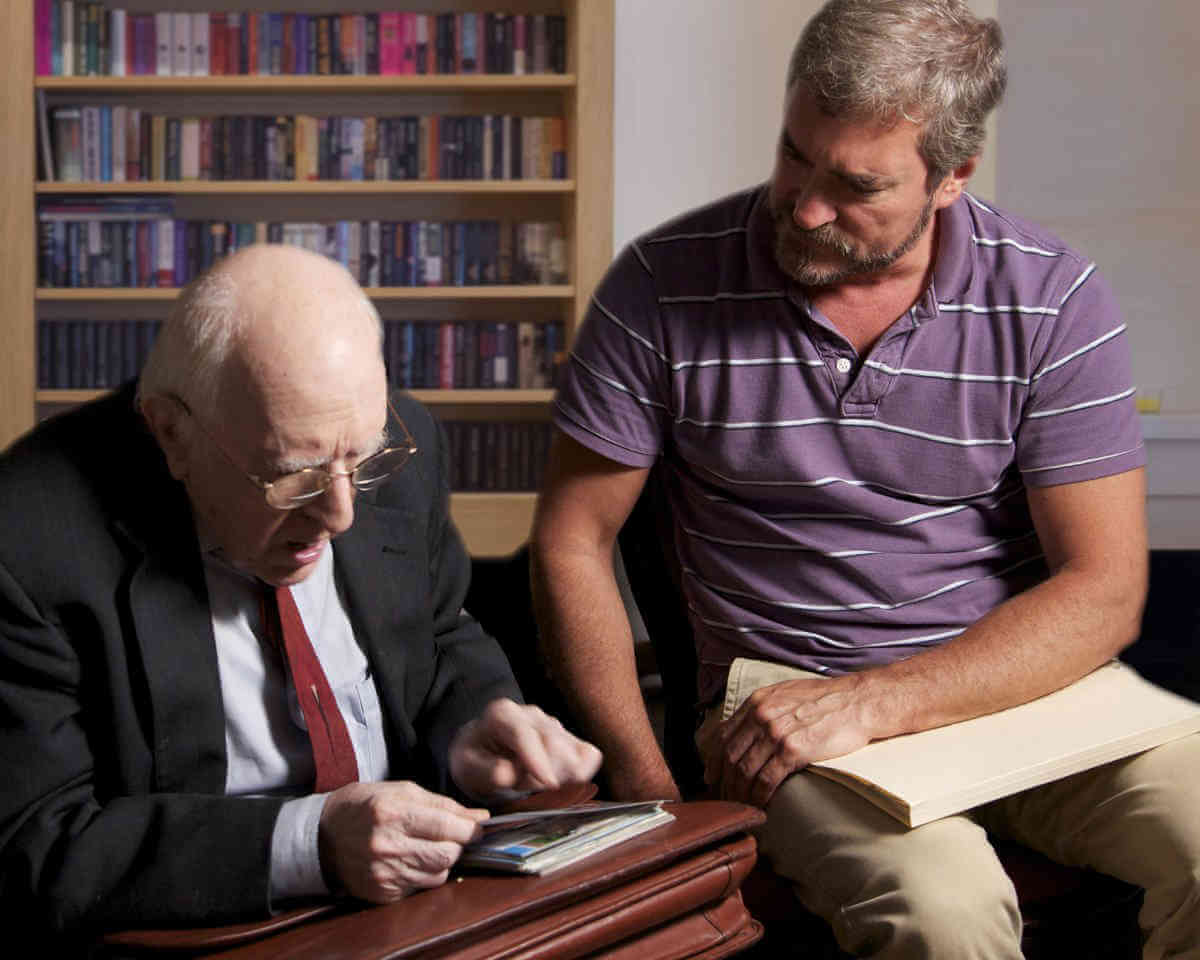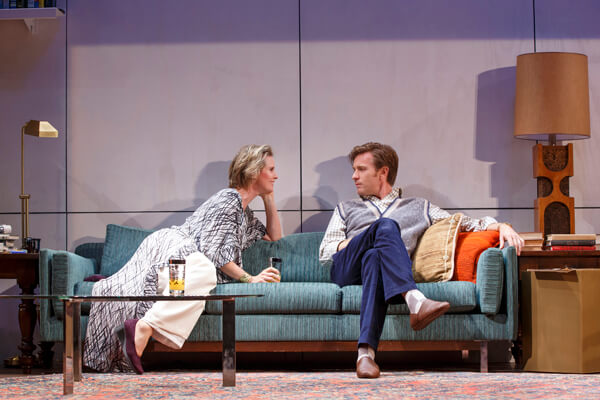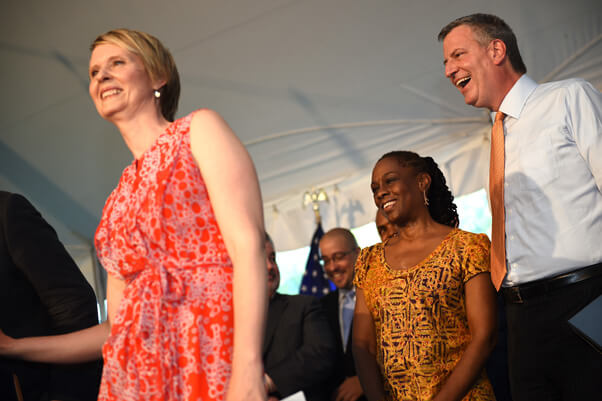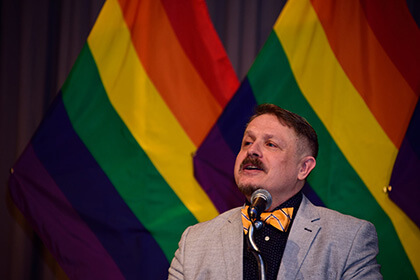Josh Howard’s powerful documentary “The Lavender Scare” uses David K. Johnson’s 2006 book of the same name to explore the stories of gay men and lesbians who were fired from their government jobs during the Cold War era because of their sexuality. The film features interviews with subjects like Navy veteran Carl Rizzi, who worked for Post Office, and Joan Cassidy, a captain in the Navy Reserves, who talk about how their careers were ruined because they were gay. In an animated sequence, Madeleine Tress, a federal government employee voiced by out lesbian actress Cynthia Nixon, recounts the probing — and demeaning — interview she endured with the FBI. Other stories feature Drew Ference, voiced by out gay actor T.R. Knight, whose sexuality affected his foreign service job in Paris.
Howard deftly traces the lives of these men and women and the horrific discriminatory experiences they faced. There is disturbing testimony from Peter Szluk, a State Department security officer of that era who targeted gays and lesbians, denying them rights and due process and offering them no opportunity to confront their accusers.
“The Lavender Scare” also showcases the efforts of the late Frank Kameny, a pioneering figure in the LGBTQ rights movement, who fought back against his firing.
In a recent phone interview, Howard spoke about his inspiring documentary.
GARY M. KRAMER: This story is actually, unfortunately, quite timely, as we see a new effort to purge the military of transgender service members. What resonated about this particular history that you wanted to adapt this book for a documentary?
JOSH HOWARD: When I came across the book, I didn’t know about this particular aspect of gay history. I was shocked by the story and it seemed like a story that needed to be told. I was working on and off for 10 years, but as time went on, it had a relevance I wasn’t anticipating that it would have.
KRAMER: You set the history, provide horrifying examples, and then present the story of an individual, Frank Kameny, who made a difference. What can you say about your approach?
HOWARD: I spent most of my career at “60 Minutes,” and they would drum into our heads, “Don’t tell me about an issue, tell me someone’s story that illustrates the issue.” That’s the approach I took. I read Johnson’s book. He did a brilliant job uncovering the documentary proof of this. When I read about individual characters, I thought — this is a documentary, and we could do a movie with real people and real stories.
KRAMER: Can you talk about the interviews in the film? They are quite remarkable.
HOWARD: Many of the interviews came from David [K. Johnson] and people who appear in his book. We went back to them and interviewed them. Jill Landes, my associate producer, was able to track down the three government officials who appear in the film. In a way, those are my favorite interviews. The victims’ stories are compelling and heartbreaking, but on some level we know what they are going to say. I had no idea if the government officials would defend their actions, apologize for them, or discuss how they felt about what they were doing. They provide a whole different level of insight into the thinking of the government at that time.
KRAMER: How did you decide what stories to include?
HOWARD: That was hard to do. There was not a lot of video material to work with. The Lavender Scare happened in private, and people didn’t talk about what was going on. It was a challenge. We tried to pick a number of stories where each one would illustrate a different aspect. Madeleine Tress — we had the most extensive FBI files. Drew Ference — we were able to track down his brother and niece and a colleague who worked with him at the embassy at Paris.
Tress died, but we had a transcript of a print interview she did with [David K.] Johnson, so we used animation and Cynthia [Nixon] reading Madeleine’s words. Drew we could create graphics that brought to life the letters he was writing home. [T.R.] Knight’s voice brought his personality to life.
KRAMER: Johnson states in the film that no gay men or lesbians were ever proven to have betrayed their country. Why do you think there was such fear toward LGBTQ people?
HOWARD: Because the government told us we should be afraid. We were in the middle of the Cold War and fearful of the Soviets. “The Kinsey Report” comes out and we hear about community of homosexuals threatening the morals of the country. It became a really good political tool. The Republicans ran with it. That’s why there are so many great parallels today. During the 1950s, there was a premium placed on conformity after the Depression and World War II. Anything that fell out of that structure was not only looked down upon, but feared.
KRAMER: You give Frank Kameny his due, illuminating a life that served a purpose beyond what he could have imagined. What inspired you about his efforts?
HOWARD: Frank loved being a gay activist and he devoted his life to it. He was a Harvard-trained astronomer at the beginning of the Space Race, when the Soviet Union launched Sputnik. Who knows what good Frank could have done for the country had he not been fired? That’s lost potential not just for the individual, but for the country.
We figure somewhere around 5,000 people had been fired before Frank. He was the first of thousands of people who said, “Wait, this doesn’t make any sense! This is wrong!” He had determination, confidence, and stubbornness to start this movement. I spent three days with him in 2010. It was such an honor to be in his presence. I see him as the Rosa Parks or Susan B. Anthony of the LGBT movement. He doesn’t have the fraction of the recognition other people have. He could be the subject of his own doc.
KRAMER: How do you think you would have fared as a gay man in the 1950s if you worked for the government?
HOWARD: That’s a fascinating question. I don’t know what I would have done. I assume I would have been fired. I am openly gay now, but I wasn’t during my long career in broadcast journalism. In the 1950s, you didn’t have to be gay — you could be fired for appearing to be gay. Heterosexuals were fired for having friends who were gay!
THE LAVENDER SCARE | Directed by Josh Howard | Full Exposure Films | Open Jun. 7 | Cinema Village, 22 E. 12th St.; cinemavillage.com




































